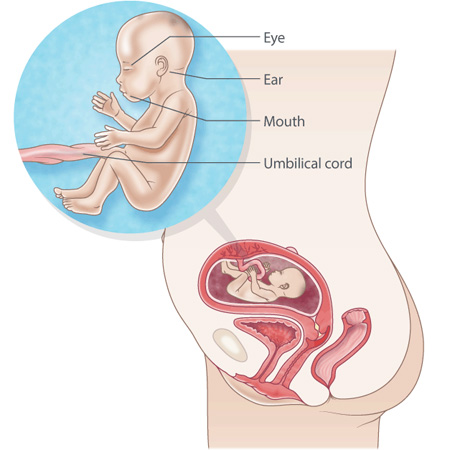
19 Weeks Pregnant: A Comprehensive Guide
Introduction
Pregnancy is a transformative journey marked by significant milestones and changes. At 19 weeks pregnant, you are well into your second trimester, and your body and baby are undergoing remarkable developments. This article provides a comprehensive guide to 19 weeks of pregnancy, covering fetal development, maternal changes, common symptoms, and essential prenatal care.
Fetal Development at 19 Weeks
At 19 weeks, your baby has grown significantly and is approximately 6 inches long and weighs about 10 ounces. The following key developments are taking place:
- Rapid growth: The fetus is experiencing a growth spurt, gaining weight and length rapidly.
- Formation of facial features: The baby’s facial features are becoming more defined, with the eyes, nose, and mouth becoming more prominent.
- Development of limbs: The arms and legs are growing longer, and the fingers and toes are becoming more distinct.
- Movement and reflexes: The fetus is becoming more active, and you may feel regular fetal movements. Reflexes, such as the Moro reflex (startle reflex), are also developing.
- Organ development: The baby’s organs, including the heart, lungs, and kidneys, are continuing to mature and function.
- Sex determination: If you have opted for a gender reveal, you may be able to determine the baby’s sex through an ultrasound at this stage.
Maternal Changes at 19 Weeks
As your baby grows, your body undergoes significant changes to accommodate and support the pregnancy. At 19 weeks, you may experience the following:
- Uterus enlargement: The uterus continues to expand, rising above the pubic bone.
- Abdominal growth: Your abdomen will become more prominent as the uterus grows.
- Weight gain: You may have gained between 10-15 pounds by this point.
- Breast changes: Your breasts may become larger and more tender as they prepare for breastfeeding.
- Skin changes: You may notice darker skin around your nipples (areolas) and a darkening line running from your navel to your pubic bone (linea nigra).
- Hormonal changes: Pregnancy hormones can cause a variety of symptoms, including mood swings, fatigue, and increased urination.
- Varicose veins: Increased blood flow during pregnancy can lead to the development of varicose veins in the legs.
Common Symptoms at 19 Weeks
While every pregnancy is unique, there are some common symptoms that many women experience at 19 weeks:
- Fetal movement: You should feel regular fetal movements by this stage.
- Heartburn and indigestion: Progesterone can relax the muscles of the digestive system, leading to heartburn and indigestion.
- Constipation: Pregnancy hormones can slow down digestion, causing constipation.
- Frequent urination: The growing uterus puts pressure on the bladder, leading to increased urination.
- Leg cramps: Leg cramps are common during pregnancy, especially at night.
- Back pain: The weight of the growing uterus can put strain on the back, causing pain.
- Fatigue: Pregnancy can be physically and emotionally draining, leading to fatigue.
- Mood swings: Pregnancy hormones can cause emotional ups and downs.
Prenatal Care at 19 Weeks
Regular prenatal care is essential for monitoring the health of both you and your baby. At 19 weeks, you may have the following appointments:
- Prenatal checkup: Your doctor will check your weight, blood pressure, and urine. They will also listen to the baby’s heartbeat and measure your abdomen to assess fetal growth.
- Ultrasound: An ultrasound may be performed to confirm the baby’s gestational age, check for any abnormalities, and determine the baby’s sex (if desired).
- Blood tests: Blood tests may be ordered to check for anemia, infections, and other health conditions.
- Genetic testing: If you are at high risk for genetic disorders, your doctor may recommend genetic testing.
Tips for a Healthy Pregnancy at 19 Weeks
- Eat a healthy diet: Consume plenty of fruits, vegetables, whole grains, and lean protein.
- Stay hydrated: Drink plenty of water throughout the day.
- Get regular exercise: Engage in moderate-intensity exercise, such as walking, swimming, or prenatal yoga.
- Get enough sleep: Aim for 7-9 hours of sleep each night.
- Manage stress: Find healthy ways to manage stress, such as yoga, meditation, or spending time in nature.
- Avoid harmful substances: Avoid smoking, alcohol, and illicit drugs.
- Attend prenatal appointments: Keep all scheduled prenatal appointments to ensure the health of you and your baby.
Conclusion
19 weeks of pregnancy is an exciting and transformative time. Your baby is growing rapidly, and your body is adjusting to the demands of pregnancy. By understanding the fetal development, maternal changes, common symptoms, and essential prenatal care at this stage, you can ensure a healthy and fulfilling pregnancy journey. Remember to consult with your healthcare provider for personalized guidance and support throughout your pregnancy.